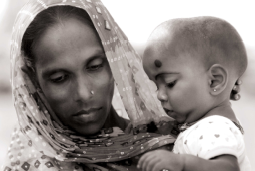By Rani Hong
A mother in Northeast India holds her daughter, her last surviving child. Her first died from malaria, another from untreated newborn jaundice, a third from unknown causes.
This child, 18 months old, suffers from hydrocephalus, an excess fluid collection around the brain. Thus far untreated, it has inhibited her brain growth and left her with developmental disabilities. She is not yet walking or speaking, and is extremely small in height and weight for her age. Left untreated, greater than 60% of children with condition will die as a result. Those who survive will be left with intellectual, physical, and neurological disabilities. With surgical management, however, hydrocephalus can be effectively treated. But in the extreme poverty of this region of the world, a region where one there is only one physician responsible for 125 tribes, access to this kind of care is not only not available, but not affordable even if there was a facility close enough to treat her.
Since beginning my work in human trafficking, people often ask me about the root of such a problem. What is really at the bottom of the tragedy? How don't these victims realize they are being tricked? While trafficking has many causes, one common thread that runs through every larger issue within the web of its horror is poverty. For those in the developed world, poverty can mean something very different that those in the third world. In places such as Northeast India, poverty doesn't mean defaulting on a mortgage. It doesn't mean having a car break down and not having the funds to repair it. It doesn't mean not going out to dinner anymore.
The kind of poverty I witnessed in this place meant that a mother was left helpless to bring care to her last surviving child, knowing that with financial resources, she could have access to medical care that could spare her daughter's life. Poverty that meant mothers eat one meal every two days so to allow their children to eat two meals every day. Poverty that deprives children of any access to school, an education that would offer a way out. Poverty of this kind breeds a desperation most anyone reading this article has never known.
And desperation brought from this kind poverty leads to desperate choices. A woman such as this mother is a prime candidate for becoming target for traffickers. "I have work for you. It is a good job, you'll be able to earn money right away and pay doctors to take care of your daughter. The job is in Mumbai, just come along with me and I will arrange everything for you." In a place of hopelessness and grief, an offer such as this has a whole new kind of appeal. A chance, maybe a single chance, to get her child the care she needs.

© 2009 Dana Marie Shepherd
This is just one of millions of stories of desperation that are told around the world every day. And these are just two of the faces that could be the next victims. On this day, they were spared the tragedy that could have added their lives to the millions of victims that exist. But this is how it happens. The developed world can't get a grip on it because we can't get a grip on this kind of poverty. Understanding that it exists at this level may help open the eyes of those best in position to intervene.
You can also visit www.troniefoundation.org to see our India Mission
** the author is the Founder of the Tronie Foundation







0 comments:
Post a Comment